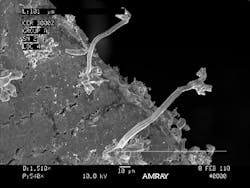Curtiss-Wright: Taming tin whiskers will take an industry-wide approach
PHOENIX, 20 Jan. 2015. Aerospace and defense systems integrators and primes are increasing efforts for growth through international sales, including foreign military sales (FMS), says Ivan Straznicky, technical fellow, Curtiss-Wright Defense Solutions in Ottawa, Canada.
At the same time, there has been an increase in global environmental regulations pertaining to electronic and electrical equipment. Electronic components have (largely) gone lead-free; most component vendors are not interested in supporting the tin/lead approach as most original equipment manufacturers (OEMs) have gone lead-free. Still, pockets of industry are continuing to focus on tin/lead. Embedded system developers know that lead-free is here to stay, and associated challenges need to be addressed.
The Restriction of Hazardous Substances (RoHS) Directive has continued to expand. The regulation was introduced in the European Union (EU) in 2006 and, in July 2011, was extended to include more electronics equipment categories.
Intensive research has been applied to mitigate the problem of tin whiskers, which are thin metallic structures that grow from tin finishes, Straznicky explains. Tin whisker risks are threefold: serious shorting concern, possibility of foreign object debris (FOD), and conductive plasma generation if it shorts at high altitudes, he says.
In addition to safety and reliability issues, legal implications are emerging, Straznicky says. For example, Apple’s iPad lead-free solder developed tin whiskers that caused short circuiting, resulting in unhappy U.S. customers.
“The good news is that intensive research is leading to effective mitigation of tin whiskers,” Straznicky mentions. “The commercial off-the-shelf (COTS) industry must be committed to maintaining the high reliability of its products for the aerospace and defense sector. The embedded industry needs to educate itself on the risks associated with the use of lead-free parts, such as tin whiskers,” he suggests.
This year, Curtiss-Wright proposes to launch a Lead-free VSO Working Group within the VITA Standards Organization (VSO).

